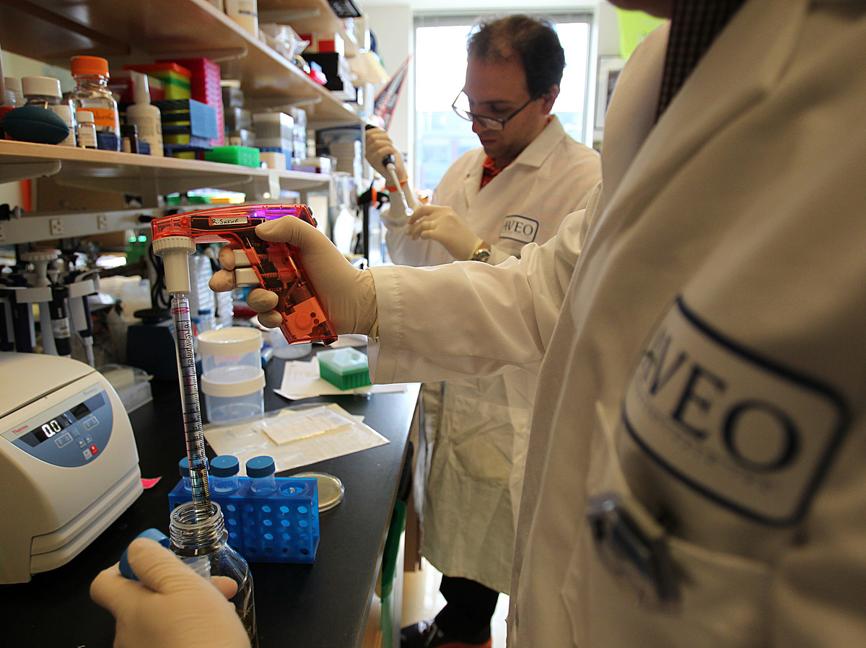
SAN FRANCISCO — For the last two years, Aveo Oncology wasn’t invited to join hundreds of drug makers giving presentations at the annual J.P. Morgan Healthcare Conference, says Michael P. Bailey, head of the Cambridge biotech.
In 2013, federal regulators rejected Aveo’s experimental kidney cancer drug after they skewered the design of its late-stage clinical trial and said the results showed “a concerning increase in the risk of death.’’ Aveo’s stock plunged, and the company laid off most of its nearly 300 workers.
Three years later, the Securities and Exchange Commission charged the biotech and three former executives with fraud for allegedly misleading investors about the prospects of the drug, called tivozanib, before the Food and Drug Administration rejected it.
But like a phoenix rising from the ashes, Aveo was back among the J.P. Morgan presenters on Thursday, the final day of a conference that draws thousands of executives and investors from around the world every January. And Bailey, 52, was trumpeting the very same cancer drug, which recently won approval from European regulators and — he contends — is poised to do so in the United States next year.
“This is truly a turnaround story,’’ Bailey, Aveo’s chief executive and president since 2015, told the Globe in an interview. “The reason ‘tivo’ is the focus of our strategy is because we knew the drug worked.’’
If the company’s drug ultimately makes it to market in the United States, it will illustrate why it’s dicey to count out any experimental treatment, even one that nearly sinks a company.
Tivozanib is intended to treat advanced renal cell carcinoma that has resisted other medicines.
Aveo began developing the drug in 2006 when its scientists acquired from a Japanese research firm a compound that starved tumors by targeting the receptors that help them grow.
Aveo licensed the commercial rights to the compound outside Asia, a move that helped it raise $81 million in a 2010 initial public offering.
The following year, Aveo struck a cost-sharing partnership with another Japanese firm, Astellas Pharma Inc., in which Aveo would apply for US approval, while Astellas would tackle the European market.
Results from early and mid-stage clinical trials looked encouraging. A 2012 article in the Journal of Clinical Oncology said tivozanib was effective in slowing the progress of renal cell carcinoma. And, Aveo executives would later say, it had fewer side effects than other medications.
Then came the critical late-stage trial, which tested the effectiveness and safety of the drug on 517 patients. Aveo told investors that the drug was moving toward approval. In fact, the FDA was telling the company it had deep concerns about how the trial had been designed.
Among other things, the FDA said the way the company was comparing tivozanib with another medicine on the market was fundamentally flawed. Also, most of the patients in the trial were in Central and Eastern Europe, raising questions about whether the results would be applicable to the US population.
Ultimately, the FDA shot down the drug after its regulators called the trial findings “uninterpretable.’’
Bailey called it “an absolute catastrophe.’’
A catastrophe that got even worse: In 2016, the company agreed to pay $4 million to settle SEC civil charges that it had misled investors about US regulators’ concerns about the drug.
The company neither admitted to nor denied the allegations, the SEC said.
Today, Aveo has under 20 employees, fewer than the number of people who attended Bailey’s presentation Thursday in a small conference room.
Bailey, who joined Aveo in 2010 as chief commercial officer and was promoted to chief executive after the company shelved tivozanib, said he wasn’t involved in designing the clinical trial.
But he always believed the cancer drug was at least as effective as others on the market and better tolerated by patients.
Using the same late-stage clinical trial results that the FDA pilloried, he said, the company sought approval for the drug from European regulators, and won it in August.
Patients began using the medicine in Germany in November, and it is performing well, Benjamin Owens, director of business development for EUSA Pharma Inc., told investors. EUSA has a license to sell the drug in Europe and other foreign markets.
Aveo also has begun the redesigned late-stage clinical trial that the FDA wanted from the prior management team. Bailey expects the results by the end of June, and if they are positive, he said, the company will once again apply for FDA approval.
“It’s easy to quit,’’ he said. “It’s much harder to persist.’’
Jonathan Saltzman can be reached at jsaltzman@globe.com.



